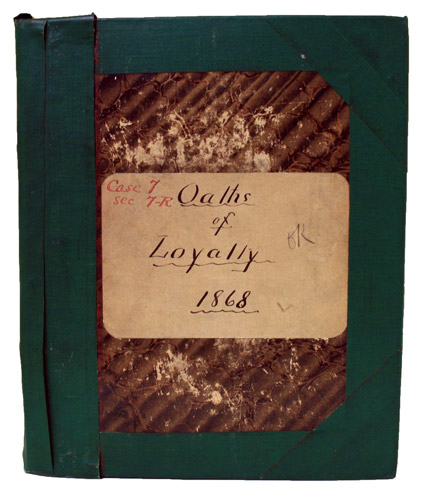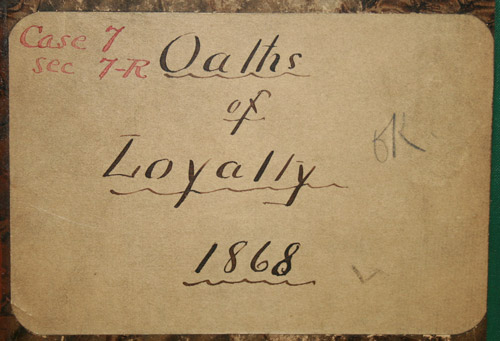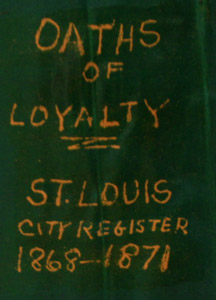
Oath of Loyalty Book, 1868-1871
JEFF-894
The artifact of the month for September is a fascinating reminder of the hostility and resentment that remained in the state after the end of the Civil War. This Oath of Loyalty book consists of pages containing the text of the "test oath" and the signatures of men holding (or seeking) public office in the city.
Signing this oath was required by the State of Missouri in order to hold "any office of honor, trust, or profit under its authority; or of being an officer, councilman, director, trustee, or other manager of any corporation, public or private, now existing or hereafter established by its authority; or of acting as a professor or teacher in any educational institution, or in any common or other school; or of holding any real estate or other property in trust for the use of any church, religious society or congregation…" The constitution also required that members of religious communities take the oath before preaching in public. It allowed no "bishop, priest, deacon, minister, elder or other clergyman of any religious persuasion, sect or denomination, to teach or preach, or solemnize marriages unless such person shall have first taken, subscribed, and filed said oath."(Cummings v. Missouri)
This book dates from 1869-1871, and offers a fascinating look at some of the public positions that existed in St. Louis at this time: Manager of the Quarantine Hospital; Superintendent of the Work House; Repairer of [the] Fire Alarm Telegraph; Wood Master [of the] Southern District; Superintendent of Public Lamps; Inspector of Boilers; City Translator; Inspector of Vaults; Deputy Meat Inspector; and Dog, Hog, Goat and Cattle Catcher.
The oath states, "I _____ do solemnly swear, that I am well acquainted with the terms of the Third Section of the Second Article of the Constitution of the State of Missouri, adopted in the year 1865, and have carefully considered the same; that I have never, directly or indirectly, done any of the acts in said section specified; that I have always been truly and loyally on the side of the United States against all enemies thereof, foreign and domestic; that I will bear true faith and allegiance to the United States, and will support the Constitution and laws thereof, as the supreme law of the land, any law or ordinance of any State to the contrary notwithstanding; that I will to the best of my ability, protect and defend the Union of the United States, and not allow the same to be broken up and dissolved, or the Government thereof to be destroyed or overthrown, under any circumstances, if in my power to prevent it; that I will support the Constitution of the State of Missouri, and that I make this oath without any mental reservation or evasion, and hold it to be binding on me."
The "Ironclad Oath," as it came to be called, was mandated by the Missouri Constitution of 1865. The constitutional convention met in St. Louis January 6-April 10, 1865 at the Mercantile Library Hall. Charles Daniel Drake, a St. Louis lawyer, became such an important force at the convention that the constitution of 1865 is often referred to as the "Drake Constitution."
"While the Convention designated the oath the 'Oath of Loyalty;' the people, seizing upon its exact intent, called it the 'Test Oath.' Its object was to test the loyalty of those who were required to take it. But the oath was too indiscriminate. It did not sufficiently recognize different degrees of guilt." (Galusha Anderson, The Story of a Border City in the Civil War. Boston: Little, Brown and Company, 1908, p. 353).
Anyone who attempted to hold specified positions without taking the oath was subject to a $500 fine and imprisonment and/or imprisonment for six months. An individual who took the oath and lied was subject to imprisonment for not less than two years. (Cummings v. Missouri)
In September 1865, Father John Cummings was pastor of St. Joseph's Church in Louisiana, Missouri. There are no records of Father Cummings' views on the Civil War, but there is a clear record of the Missouri Catholic Church's response to the new Constitution. Archbishop Peter Kenrick felt that the oath took away religious liberty (Dictionary of Missouri Biography, p. 224) and Father Pierre Jean DeSmet wrote, "The priests are generally agreed that, on principle, such an oath cannot be taken, because our authority does not emanate from the State, and we cannot, without compromising the ecclesiastical state, consent to take it. No Catholic priest in Missouri will take it." (Duane G. Meyer, The Heritage of Missouri, St. Louis: River City Publishers, 1982, p. 410). Father Cummings refused to take the oath, preached, was fined $500, refused to pay the fine and was jailed. The case went to the Missouri Supreme Court, which ruled in the state's favor. The Archbishop financed this as a test case to go to the United States Supreme Court and challenge the constitutionality of the oath. (Dictionary of Missouri Biography, p. 224)
At the same time, Union general and war hero Frank Blair decided to bring his own case to the Supreme Court after he was denied the right to vote after refusing to take the oath as written in the state constitution. (Blair v. Thompson and Ridgley) Blair stated that he could not take the oath, having been in opposition to the government of Missouri at a time when the government was in danger of seceding from the union under Governor Claiborne Jackson. Blair's case resulted in a split court and made no impact on the law. Father Cummings had better luck with his case in the hands of the lawyer David Dudley Field, brother of Justice Stephen Johnson Field.
During the case, David Dudley Field stated, "This is not an oath of loyalty to the United States. The government of Missouri has been, in fact, hostile to the United States. This is a matter of history. Being in armed hostility to this hostile State government was an act of loyalty to the United States: an act not to be punished, but to be rewarded."
The lawyer for the state, J.B. Henderson argued, "Beyond the limits of Missouri, they [the laws allowing the oaths], perhaps have had but few advocates. But beyond those limits, no man knows the terrible ordeal through which her people passed during the late Rebellion. To appreciate their conduct properly, one must have been on the soil of the State, and that alone is not sufficient: he must have been an active participant in the struggle for national life and personal security." (Cummings v. Missouri)
The majority opinion was given by Justice Stephen Johnson Field, "The theory upon which our political institutions rests is, that all men have certain inalienable rights - that among those are life, liberty, and the pursuit of happiness; and that in the pursuit of happiness all avocations, all honors, all positions, are alike open to every one, and that in the protection of these rights all are equal before the law. Any deprivation of suspension of any of these rights for past conduct is punishment, and can be in no otherwise defined…Under this form of legislation the most flagrant invasion of private rights, in periods of excitement, may be enacted, and individuals, and even whole classes, may be deprived of political and civil rights."
He then quoted Alexander Hamilton writing about a loyalty oath in New York after the treaty with the British in 1783, "it substitutes for the established and legal mode of investigating crimes and inflicting forfeitures, one that is unknown to the Constitution, and [is] repugnant to the genius of our law."
The court ruled that the law was unconstitutional because it was ex post facto, punishing people for actions that were legal when committed and for presuming that clergymen were guilty of treason until proven innocent.
In spite of Father Cummings' victory in this case in 1866, the loyalty oath was still in use (in this book, only for public positions) until 1871 when it was finally repealed by the General Assembly. In 1875, Missouri ratified a new constitution without the test oath provision.
As we can see from the example involving the Revolutionary War, the Civil War was not the first time that loyalty oaths were used in the United States. During the Cold War, other similar oaths were developed to exclude members of the Communist party. Cummings v. Missouri was cited in the case of American Communications Association v. Douds- a case testing the Taft-Hartley Act of 1947, which forced labor leaders to sign a statement that they did not belong to the Communist Party.
An index of this book is available with a list of all the names of the people signing the oath, the date and the position they sought. The complete scan of the book is attached in two parts-Part 1 consists of Oaths 1-225 and Part 2 Oaths 226-424.
Works Cited:
Anderson, Galusha, The Story of a Border City in the Civil War. Boston: Little, Brown and Company, 1908.
Cummings v. Missouri, 71 U.S. 277, 1866
"Francis Blair", "James Cummings" and "Charles Drake", The Dictionary of Missouri Biography. Columbia: University of Missouri Press, 1999.
Meyer, Duane G. The Heritage of Missouri, St. Louis: River City Publishers, 1982.


